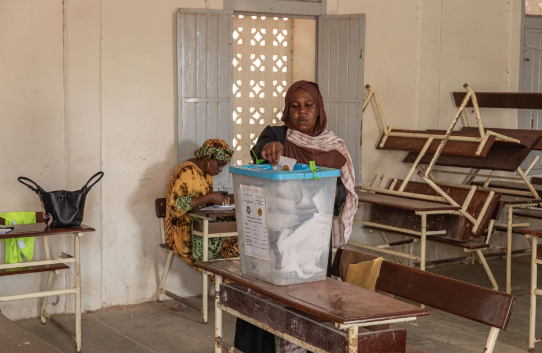On Saturday, Mauritanians went to the polls to determine whether President Mohamed Ould Cheikh El Ghazouani will continue to lead their desert country, known as a stable haven in Africa’s turbulent Sahel region.
Approximately 1.9 million registered voters are participating in the election, where they have the option to choose among seven candidates competing for the presidency of the vast nation.
Mauritania, which has largely managed to resist the wave of jihadism affecting its neighbors, is also on the brink of becoming a gas producer. An AFP journalist observed voters forming lines at two polling stations situated at a school in central Nouakchott, the capital, before the polling began at 0700 GMT.
Reflecting the deeply conservative Islamic traditions of the country, men and women queued in separate lines.
The electoral commission reported that about 40 percent of eligible voters had cast their ballots two hours before the polling stations closed. This election is a significant moment for Mauritania, as it continues to balance stability and economic growth in a challenging regional environment.
“I am here to fulfil my civic duty to complete the democratic process that began some decades back,” said Mohamed Salem M’Seika, a 50-year-old voter.
Kertouma Baba, 26, said he wanted “progress in education and opportunities for the youth”.
Barka Kharachi, 26, said she wanted “a big change” to “sweep away all the corrupt men”.
Polling closed at 1900 GMT, and the first results were expected on Saturday evening. Official results are set to be announced on Sunday or Monday.
No major incidents were reported in the country.
“Everything went well. We didn’t have any problems either with voters or candidate representatives,” El Waght Abdallah, head of a polling station in a working-class district of Nouackchott, told AFP.
The 2019 election brought Mohamed Ould Cheikh El Ghazouani to power, marking the first transition between two elected presidents in Mauritania since gaining independence from France in 1960. This followed a series of coups from 1978 to 2008. Ghazouani, a former general, is widely favored to secure a second term, with some observers predicting a first-round victory due to opposition divisions and the president’s resources.
If no candidate secures a majority, a second-round vote is scheduled for July 14. The campaign has been largely peaceful, except for some scuffles on Monday in the northern town of Nouadhibou, where supporters of one candidate clashed with those of another, according to the interior ministry.
Ghazouani, previously a security chief and army leader, is credited with maintaining the country’s relative security. Despite the Sahel experiencing numerous military coups and rising jihadism, particularly in Mali, Mauritania has not seen a terrorist attack since 2011.
– ‘Democratic spirit’ –
Throughout the campaign, Ghazouani promised his supporters “a resounding first-round victory”.
Posters of his face accompanied by the slogan “the safe choice” overshadow those of his political opponents both in Nouakchott and across the country.
The president cast his vote in Nouakchott on Saturday morning.
“I congratulate the Mauritanians for their high level of consciousness and their democratic spirit,” he told reporters outside the polling station.
He welcomed a “climate of peace and tranquillity” during the election day.
After a first term hit by the fallout from the Covid-19 pandemic and the war in Ukraine, Ghazouani has made fighting poverty and supporting young people priority issues.
Over 70 percent of Mauritania’s population is under 35, with young people increasingly drawn to the prospect of a better future in Europe or the United States.
With a second mandate, the incumbent has said he hopes to make more reforms thanks to a favourable economic outlook.
Growth should average 4.9 percent or 3.1 percent per capita for the period 2024-2026, according to the World Bank, spurred by the launch of gas production in the second half of this year.
Inflation has fallen from a peak of 9.5 percent in 2022 to five percent in 2023, and should continue to drop to 2.5 percent in 2024.
– ‘One-sided election’ –
The president’s two main rivals are rights activist Biram Dah Abeid, runner-up in the last two presidential elections, and the leader of the Islamist Tewassoul party, Hamadi Ould Sid’ El Moctar.
Both vow radical change, “an end to mismanagement and corruption”, and far-reaching education and justice reform.
They have also warned of fraud after denouncing a “one-sided election” and accused the Independent National Electoral Commission (CENI) of “doing nothing to ensure that it runs smoothly”.
The two candidates both cast their votes Saturday morning.
Dah Abeid called on his supporters to “fight fraud by all legal means”.
The opposition strongly contested the legislative elections a year ago, which were won by Ghazouani’s party.
The African Union has sent a team of 27 short-term observers, while the European Union has sent three election experts.
The Mauritanian government has set up a national election monitoring body, which the opposition has denounced as a tool for manipulating the ballot.



